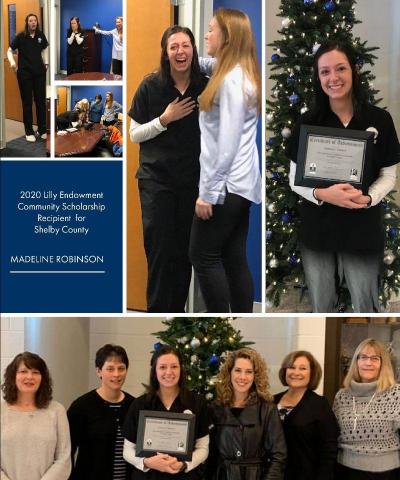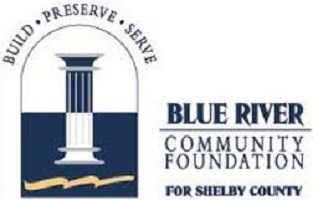Blue River Community Foundation submitted the following article announcing the 2020 Lilly Endowment Community Scholarship for Shelby County - Maddie Robinson.
Blue River Community Foundation (BRCF) is pleased to announce the recipient of the 2020 Lilly Endowment Community Scholarship for Shelby County. This prestigious award grants full tuition to any accredited public or private college or university in Indiana. In addition, it provides an annual stipend of $900 for required books and equipment.
Madeline (Maddie) E. Robinson is the Class of 2020 recipient for Shelby County. Maddie is the daughter of Rebecca and Heath Robinson. She will graduate in May from Waldron Jr./ Sr. High School and plans to attend Marian University to pursue a degree in nursing.

At the time of application, Maddie was ranked second in her graduating class and her GPA was 3.92 on a 4.0 scale. She is involved in several extracurricular activities including; National Honor Society (Vice President), Student Council (President), Sunshine Society (President), HOSA (Health Occupation Students of America), basketball, volleyball and softball. In addition, she is an active community volunteer who has served in various capacities for Waldron United Methodist Church, Shelby Senior Services, and her school community. Maddie is also employed at Especially Kidz as a certified nursing assistant.
Maddie’s dedication to pursuing a career in nursing is not only demonstrated through her current employment, but also with the academic track she committed to prior to high school.
After learning of Maddie’s selection, Whitney Moore, Waldron Jr./Sr. High School (WHS) Counselor, stated, “Maddie has been determined to enter the medical field in some way as long as I have known her. She approached me her freshman year to ask if we could arrange her four years at WHS to accommodate for 3 years (instead of our normal 2) at Blue River Career Programs (BRCP) in the Health Science programs and internship. Maddie has taken classes every summer to keep up with the requirements of the Academic Honors and Technical Honors Diplomas and provide flexibility to attend the career center. She has done internships and job shadowing to solidify her plans for life after high school and college. She is a highly motivated individual who is passionate about serving others and making a difference in the world, which she demonstrates regularly in her extracurricular involvements.”
The Foundation’s competitive selection process for this scholarship begins with an online application. Students must provide a written essay, two letters of recommendation, and a scholastic profile completed by their school counselor. Meaningful community involvement, extracurricular activities, academic history and commitment, character, and the student’s potential for success are also considered by the BRCF scholarship committee during the application evaluation process. Without question, selecting a student for the Lilly Endowment Community Scholarship continues to be a difficult decision for BRCF’s Scholarship Selection Committee.
According to Julie Alvis, Youth and Education Program Officer for BRCF, the committee evaluated a total of 55 fully completed, qualifying applications for the 2020 scholarship. “Shelby County students continue to impress the members of our scholarship committee. In addition to excelling academically, these students are leaders that are contributing to our community.”
After thorough review of each application, which the Foundation’s scholarship committee does in the blind (applicant’s names are removed from viewing during this phase of the selection process), eight finalists were selected for a personal interview. Selection criteria considered during the interview include determination, decision making skills, knowledge of what is required to succeed in college and the ability to apply that knowledge, goal orientation and evidence of life planning, and intellectual curiosity in the student’s chosen field.
In addition to Maddie, Alexandra Carter (Shelbyville High School), Catherine (McKenna) Hall (Shelbyville High School), Brooke Haney (Triton Central High School), Karmen Kissell (Southwestern High School), Reid Schene (Shelbyville High School), Joshua von Werder (Shelbyville High School), and Landon Watson (Shelbyville High School) were also interviewed for the scholarship. Due to their exceptional academic and personal achievements, these seven students will receive a four-year renewable scholarship from one of the 90 funds administered by BRCF.
Independent Colleges of Indiana oversees the administration of the Lilly Endowment Community Scholarship program and provides final review and selection of the recipients. ICI is a nonprofit corporation that represents 30 regionally accredited degree granting, nonprofit, private colleges and universities in the state and oversees the administration of the Lilly Endowment Community Scholarship Program.
Since the program’s inception in 1998, 4,769 students have been awarded over $405M in full-tuition scholarships; including the 23rd cohort.
The primary purposes of the Lilly Endowment Community Scholarship Program are:
1. to help raise the level of educational attainment in Indiana
2. to increase awareness of the beneficial roles Indiana community foundations can play in their communities
3. to encourage and support the efforts of current and past Lilly Endowment Community Scholars to engage with each other and with Indiana business, governmental, educational, nonprofit and civic leaders to improve the quality of life in Indiana generally and in local communities throughout the state.















